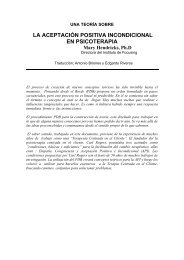8 Focusing en de experiëntiële aspecten van psychotherapie
8 Focusing en de experiëntiële aspecten van psychotherapie
8 Focusing en de experiëntiële aspecten van psychotherapie
You also want an ePaper? Increase the reach of your titles
YUMPU automatically turns print PDFs into web optimized ePapers that Google loves.
594 Literatuur<br />
Cain, D.J. (2002). Defining characteristics, history, and evolution of humanistic <strong>psychotherapie</strong>s. In D.J.<br />
Cain & J. Seeman (Red.), Humanistic <strong>psychotherapie</strong>s: Handbook of research and practice (pp. 3-54).<br />
Washington, DC: APA.<br />
Cain, D.J. (Guest Ed.) (2007). Contributions of humanistic <strong>psychotherapie</strong>s to the field of psychothera-<br />
py (Special issue). Journal of Contemporary Psychotherapy, 37(1), 1-58.<br />
Cain, D.J., & Seeman, J. (2002). Humanistic <strong>psychotherapie</strong>s: Handbook of research and practice. Wash-<br />
ington: A.P.A.<br />
Camus, A. (1971). De mythe <strong>van</strong> Sisyphus. Amsterdam: De Bezige Bij.<br />
Carkhuff, R. (1969). Helping and human relations. A primer for lay and professional helpers. Vol. I & II.<br />
New York: Holt-Rinehart-Winston.<br />
Castonguay, L.G., & Beutler, L.E. (2006a). Principles of therapeutic change. A task force on participants,<br />
relationships and technique factors. Journal of Clinical Psychology, 62, 631-638.<br />
Castonguay, L.G., & Beutler, L.E. (Red.). (2006b). Principles of therapeutic change that work. Oxford:<br />
Oxford University Press.<br />
Cedar, B., & Le<strong>van</strong>t, R.F. (1990). A meta-analysis of the effects of par<strong>en</strong>t effectiv<strong>en</strong>ess training. The<br />
American Journal of Family Therapy, 18, 373-384.<br />
Claiborn, D., Goodyear, R.K., & Horner, P.A. (2002). Feedback. In J.C. Norcross (Red.), Psychotherapy<br />
relationships that work. Therapist contributions and responiv<strong>en</strong>ess to pati<strong>en</strong>ts (pp. 217-233). Oxford:<br />
Oxford University Press.<br />
Chambless, D.L., & Hollon, S.D. (1998). Defining empirically supported therapies. Journal of Clinical and<br />
Consulting Psychology, 66, 7-18.<br />
Cluckers, G. (1986). Steungev<strong>en</strong><strong>de</strong> kin<strong>de</strong>r<strong>psychotherapie</strong>: E<strong>en</strong> an<strong>de</strong>re weg. Dev<strong>en</strong>ter: Van Loghum.<br />
Cluckers, G. (1989). “Containm<strong>en</strong>t” in <strong>de</strong> therapeutische relatie: <strong>de</strong> therapeut als drager <strong>en</strong> zingever. In H.<br />
Vertomm<strong>en</strong>, G. Cluckers & G. Lietaer (Red.), De relatie in therapie (pp. 49-64). Leuv<strong>en</strong>: Universitaire Pers<br />
Leuv<strong>en</strong>..<br />
Cluckers, G., & Meurs, P. (2005). Brugg<strong>en</strong> tuss<strong>en</strong> d<strong>en</strong>k-wijz<strong>en</strong>? Reflecties over m<strong>en</strong>talisatie, ontwikkeling<br />
<strong>en</strong> (kin<strong>de</strong>r)<strong>psychotherapie</strong>. In M. Kinet & R. Vermote (Red.), M<strong>en</strong>talisatie (pp. 11-34). Antwerp<strong>en</strong>/Apeldoorn:<br />
Garant.<br />
Coff<strong>en</strong>g, T. (1985). Focuss<strong>en</strong>, e<strong>en</strong> cursus als pre-therapie.Tijdschrift voor Psychotherapie, 11, 402-409.<br />
Coff<strong>en</strong>g, T. (1986). <strong>Focusing</strong> <strong>en</strong> rouwtherapie. In R. Van Bal<strong>en</strong>, M. Leijss<strong>en</strong> & G. Lietaer (Red.), Droom <strong>en</strong><br />
werkelijkheid in cli<strong>en</strong>t-c<strong>en</strong>tered <strong>psychotherapie</strong> (pp.189-195). Leuv<strong>en</strong>: Acco.<br />
Coff<strong>en</strong>g, T. (1988). The use of <strong>Focusing</strong> in Experi<strong>en</strong>tial Psychotherapy. Vi<strong>de</strong>o International Confer<strong>en</strong>ce<br />
on Cli<strong>en</strong>t-c<strong>en</strong>tered and Experi<strong>en</strong>tial Psychotherapy, Leuv<strong>en</strong>.<br />
Coff<strong>en</strong>g, T. (1991). The phasing and timing of focusing in therapy. The Folio. A Journal of <strong>Focusing</strong> and<br />
Experi<strong>en</strong>tial Psychotherapy, 10, 40-50.<br />
Coff<strong>en</strong>g, T. (1992). Het therapieproces in het licht <strong>van</strong> focuss<strong>en</strong>. VRT-Periodiek, 30, 7-23.<br />
Coff<strong>en</strong>g, T. (1994). Re-contacting the child. Vi<strong>de</strong>o International Confer<strong>en</strong>ce Cli<strong>en</strong>t-c<strong>en</strong>tered and Experi<strong>en</strong>tial<br />
Psychotherapy, Gmund<strong>en</strong>.<br />
Coff<strong>en</strong>g, T. (1995). Psychotherapie <strong>en</strong> vroege rouw. Tijdschrift voor Psychotherapie, 21, 268-289.<br />
Coff<strong>en</strong>g, T. (1996a). <strong>Focusing</strong> <strong>en</strong> groeps<strong>psychotherapie</strong>. In T.J.C.Berk, M.P. Bolt<strong>en</strong>, M. elBoushy, E. Gans,<br />
T.A.E. Hoytink & M.F. <strong>van</strong> Noort (Red.), Handboek groeps<strong>psychotherapie</strong> (M9.1-25). Hout<strong>en</strong>: Bohn<br />
Stafleu Van Loghum.<br />
Coff<strong>en</strong>g, T. (1996b). Experi<strong>en</strong>tial and pre-experi<strong>en</strong>tial therapy for multiple trauma. In U. Esser, H. Pabst<br />
& G.W. Speierer (Red.), The Power of the person-c<strong>en</strong>tered approach. (pp.185-203). Köln:GWG.










